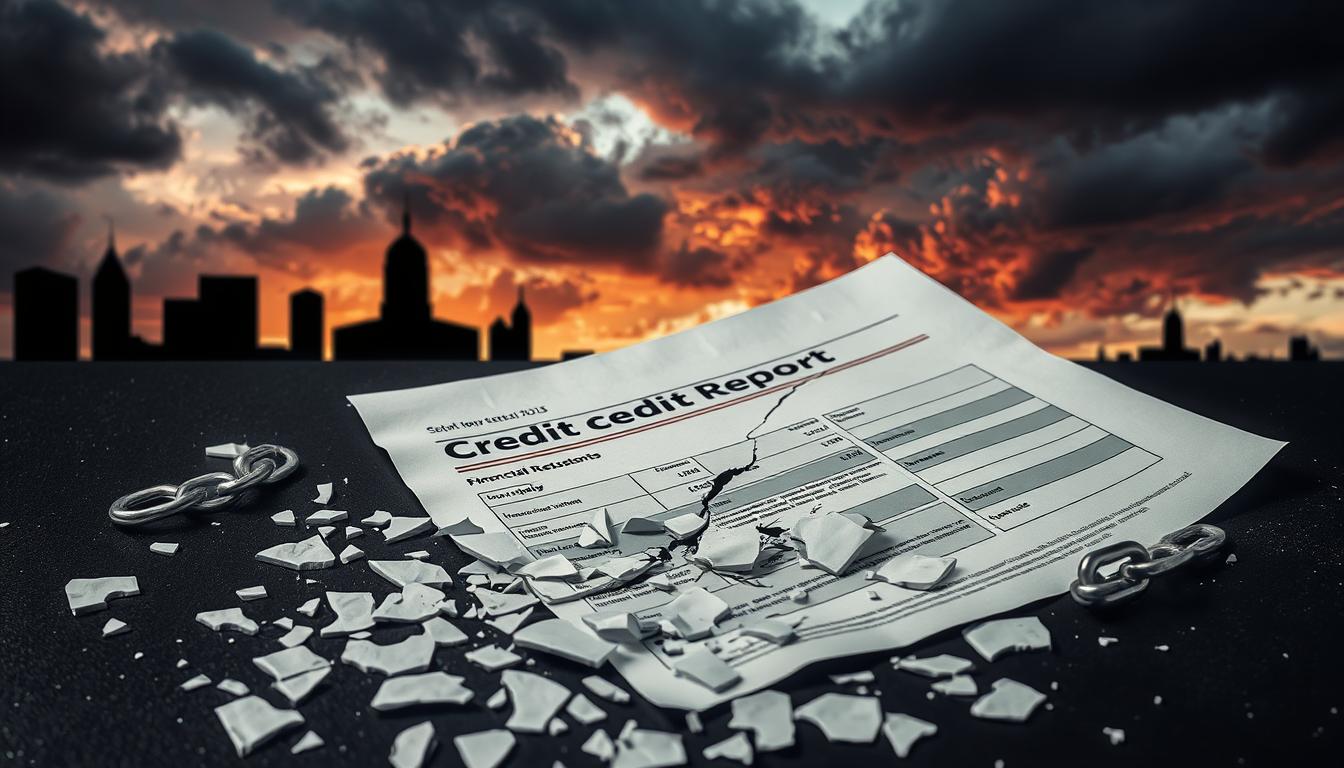Your credit history is vital to your financial life. It shows your creditworthiness and affects loans, mortgages, and job chances. Trying to erase or change this record illegally can have serious, lasting effects.
This information is crucial in our digital world. The urge to alter it may be strong. But it’s important to know the risks of such actions.
We’ll explore the dangers of erasing credit history illegally. You’ll learn about credit history’s importance and the risks of fraud. We’ll also share legal ways to boost your credit score.
Discover how to manage your finances responsibly. Find out about ethical strategies for improving your credit. Learn to avoid the pitfalls of fraudulent activities.
Key Takeaways
- Attempting to erase your credit history illegally is a risky and unlawful practice that can lead to severe financial and legal consequences.
- Understanding the true nature and importance of your credit history is crucial for managing your finances effectively.
- Legitimate and ethical alternatives exist for improving your credit score and financial well-being.
- Engaging in fraudulent activities, such as identity theft or credit repair scams, can result in heavy penalties, including fines and even jail time.
- Protecting yourself from credit-related fraud and scams is essential for maintaining financial stability and security.
Understanding Credit History and Its Importance
Your credit history is vital for your financial health. It’s a record of your credit activities, past and present. Lenders, landlords, and employers use it to judge your financial reliability.
This information helps them make decisions about your creditworthiness. It can affect many areas of your life, from loans to jobs.
What is Credit History?
Credit history shows your credit-related behavior over time. It includes your credit accounts, limits, and payment records. Credit bureaus like Experian, Equifax, and TransUnion keep this information.
They use it to calculate your credit score. This score represents how trustworthy you are with credit.
Why Credit History Matters
- Loan Approval: A good credit history boosts your chances of getting loans and credit cards. Lenders use it to check if you can repay debts.
- Employment Opportunities: Some employers look at credit history when hiring. It can show how financially responsible you are.
- Housing Rentals: Landlords often check credit histories. They want to know if you’ll pay rent on time.
- Insurance Rates: Insurance companies may use your credit info to set rates. This applies to auto, home, and renter’s insurance.
- Financial Health: Good credit can lead to better interest rates and loan terms. It can also mean lower fees for credit-based services.
A healthy credit history is key to financial stability. It can open doors in both your personal and work life.

“Your credit history is the foundation of your financial health. It’s not just about getting approved for loans – it’s about the opportunities that a strong credit profile can open up for you.”
| Credit History Component | Impact on Credit Score |
|---|---|
| Payment History | 35% |
| Amounts Owed | 30% |
| Length of Credit History | 15% |
| Credit Mix | 10% |
| New Credit | 10% |
The Consequences of Illegally Erasing Credit History
Trying to illegally erase or manipulate credit history can lead to severe consequences. These include financial penalties, legal issues, and credit-based discrimination. The effects can be far-reaching and long-lasting.
Illegal credit history erasure can result in financial penalties. Offenders may face hefty fines and legal fees, worsening their financial situation. They might also have to repay fraudulently obtained credit or loans.
Legal troubles are another outcome of this illegal activity. Depending on the offense, individuals may face criminal charges like fraud or identity theft. These charges can lead to jail time and a permanent criminal record.
Credit-based discrimination is a significant risk of illegal credit history erasure. Employers, landlords, and lenders often check credit reports. Any sign of unlawful credit history manipulation can result in rejection or unfavorable treatment.
| Consequence | Description |
|---|---|
| Financial Penalties | Individuals may face hefty fines and legal fees, as well as the requirement to pay back any fraudulently obtained credit or loans. |
| Legal Issues | Individuals may face criminal charges such as fraud or identity theft, resulting in jail time and a permanent criminal record. |
| Credit-based Discrimination | Employers, landlords, and lenders may reject or provide unfavorable treatment to individuals with a history of unlawful credit history manipulation. |
The risks of engaging in these practices are severe and long-lasting. It’s crucial to understand the consequences and explore legal alternatives for improving credit standing.

Common Illegal Methods for Erasing Credit History
Some people try illegal ways to erase their credit history. These methods can lead to severe legal and financial problems. Two common illegal approaches are identity theft and credit repair scams.
Identity Theft
Identity theft is a serious crime. It involves using someone else’s personal information without permission. Thieves may use Social Security numbers or credit card details to get credit or goods.
They might open new accounts or take over existing ones. This erases the victim’s credit history and damages their creditworthiness. The results can be devastating for victims.
Clearing one’s name and restoring credit can be tough. It’s often time-consuming, expensive, and emotionally draining.
Credit Repair Scams
Fraudulent credit repair schemes are another illegal method. These scams promise to remove negative items from credit reports. They often charge high fees and use deceptive tactics.
Scammers might tell clients to create a new identity. They may also instruct them to dispute legitimate debts. These actions don’t improve credit and can lead to legal troubles.
Victims may face fraud charges, identity theft accusations, and financial penalties. Their credit can be further damaged, and they might even face criminal prosecution.
Illegal credit history erasure methods carry significant legal and financial risks. It’s best to explore legitimate strategies for improving credit scores and financial standing.

Erase Credit History Illegally: A Risky and Unlawful Approach
Illegally erasing credit history is extremely risky and ill-advised. It’s unethical and firmly against the law. The consequences are severe and can derail your financial future.
Illegal credit history erasure carries many risks. Identity theft and credit repair scams can lead to fines, criminal charges, and jail time. These actions can devastate your finances and harm your ability to secure loans or jobs.
| Illegal Credit History Erasure | Ethical Alternatives |
|---|---|
| Identity Theft | Credit Counseling |
| Credit Repair Scams | Debt Consolidation |
The legal ramifications of erasing credit history can be far-reaching. The financial impact can cripple your financial well-being. It becomes harder to rebuild credit and secure a stable future.
“The consequences of illegal credit history erasure can be severe and far-reaching, with the potential to derail an individual’s financial well-being for years to come.”
Explore ethical alternatives if you’re struggling with credit issues. Credit counseling and debt consolidation are legitimate ways to improve your credit score. These methods can help you regain financial stability.

Resist the urge to erase your credit history illegally. The risks and legal consequences outweigh any benefits. Choose ethical alternatives to rebuild your credit responsibly and sustainably.
Legal Alternatives to Improve Your Credit Score
Illegal methods to erase credit history are risky. There are legal ways to boost your credit score. Credit counseling and debt consolidation are two effective options.
Credit Counseling
Credit counseling services offer guidance for managing debt and building credit. They help create personalized plans for legal credit improvement. These plans include advice on budgeting and responsible credit use.
Partnering with a reputable agency teaches strategies for responsible credit management. This can lead to a healthier financial future.
Debt Consolidation
Debt consolidation combines multiple debts into one payment. This simplifies repayment and may reduce interest rates. It can improve your overall credit counseling situation.
Consistently making on-time payments can positively impact your credit score. This approach demonstrates your ability to manage debt responsibly.
Avoid illegal shortcuts to erase credit history. They can have devastating long-term consequences. Instead, use legal methods to rebuild your credit responsibly.
“The path to a strong credit score is paved with patience, discipline, and responsible financial decisions.”
The Impact of Negative Credit on Finances and Life
A healthy credit profile is vital for financial stability. Negative credit can have far-reaching effects on various aspects of life. Let’s explore the significant impact of poor credit history.
Negative credit makes securing loans challenging. Lenders often hesitate to approve applications from individuals with late payments or high debt-to-income ratios. This can hinder major purchases or investments.
Poor credit can also affect renting apartments or getting jobs. Many landlords and employers now conduct credit checks during their screening process. A bad credit history can block housing or job opportunities.
| Impact of Negative Credit | Potential Consequences |
|---|---|
| Securing Loans | Difficulty obtaining mortgages, auto loans, or personal lines of credit |
| Renting an Apartment | Landlords may reject applications due to poor credit history |
| Employment Opportunities | Employers may conduct credit checks and use the results in hiring decisions |
| Opening New Credit Accounts | Lenders may be hesitant to approve new credit applications |
Negative credit can lead to more than just financial troubles. It can cause increased stress, anxiety, and even depression. Life consequences of poor credit can be profound.
Credit-related discrimination can hinder personal and professional goals. A positive credit profile is crucial for financial security and overall well-being. Understanding these impacts can motivate proactive steps to improve credit scores.
By improving credit, individuals can avoid the financial impact and life consequences of credit-based decisions. They can also reduce credit-related discrimination in various aspects of life.
Ethical Practices for Credit Repair and Rebuilding
Repairing and rebuilding credit can be done ethically and legally. Several responsible strategies can help improve your financial standing over time. By adopting responsible credit management and developing financial literacy, you can achieve credit rebuilding goals ethically.
Disputing errors on your credit report is an effective way to improve your credit. Review your report carefully and identify any mistakes. Then, work with credit bureaus to correct these errors.
Credit education is crucial for staying vigilant about your credit history. Being aware of your credit details helps you maintain a healthy financial profile.
- Regularly review your credit report for errors and inaccuracies
- Dispute any incorrect information with the credit bureaus
- Develop a habit of making timely payments on all your bills and loans
Credit-building tools can also help with credit repair. Secured credit cards and credit-builder loans are useful options. These tools help establish a positive payment history for those with poor credit.
“Responsible credit management is the foundation of sustainable credit rebuilding. It’s about developing healthy financial habits, not quick fixes.”
The key to ethical credit repair is cultivating financial literacy. Understanding credit history is crucial for maintaining a healthy financial profile. Taking proactive steps can improve your credit score through legitimate means.
Protecting Yourself from Credit-Related Fraud and Scams
Protecting your finances from credit-related fraud is crucial in today’s digital world. Stay alert and take proactive steps to guard your credit history and personal data.
Warning Signs of Fraudulent Activities
Know the common signs of credit-related fraud to spot and avoid potential threats. Be cautious of these red flags:
- Unsolicited offers for credit repair services or debt consolidation
- Requests for personal information, such as your Social Security number or bank account details, from unknown sources
- Suspicious or unfamiliar credit account activities, such as new accounts being opened in your name without your knowledge
- Unexplained changes in your credit report or sudden drops in your credit score
Recognizing these warning signs helps protect your credit protection and financial security. Stay alert to safeguard your financial well-being.
“Identity theft and credit-related fraud can have devastating long-term consequences on your financial well-being. Staying vigilant and proactive is the best defense against these scams.”
Always verify the authenticity of offers or requests. Report any suspicious activities to the proper authorities right away.
Conclusion
Trying to erase credit history illegally is dangerous and unethical. It can lead to serious consequences. Instead, focus on responsible credit management and legal ways to improve your credit.
Credit counseling and debt consolidation are legitimate strategies to boost creditworthiness. These methods can enhance your financial well-being without breaking the law.
The choice is yours: take the ethical path or risk severe penalties. Illegal credit erasure can cause long-term damage to your finances.
Credit rehabilitation may be challenging, but it’s the best way forward. It leads to lasting financial health and peace of mind.

